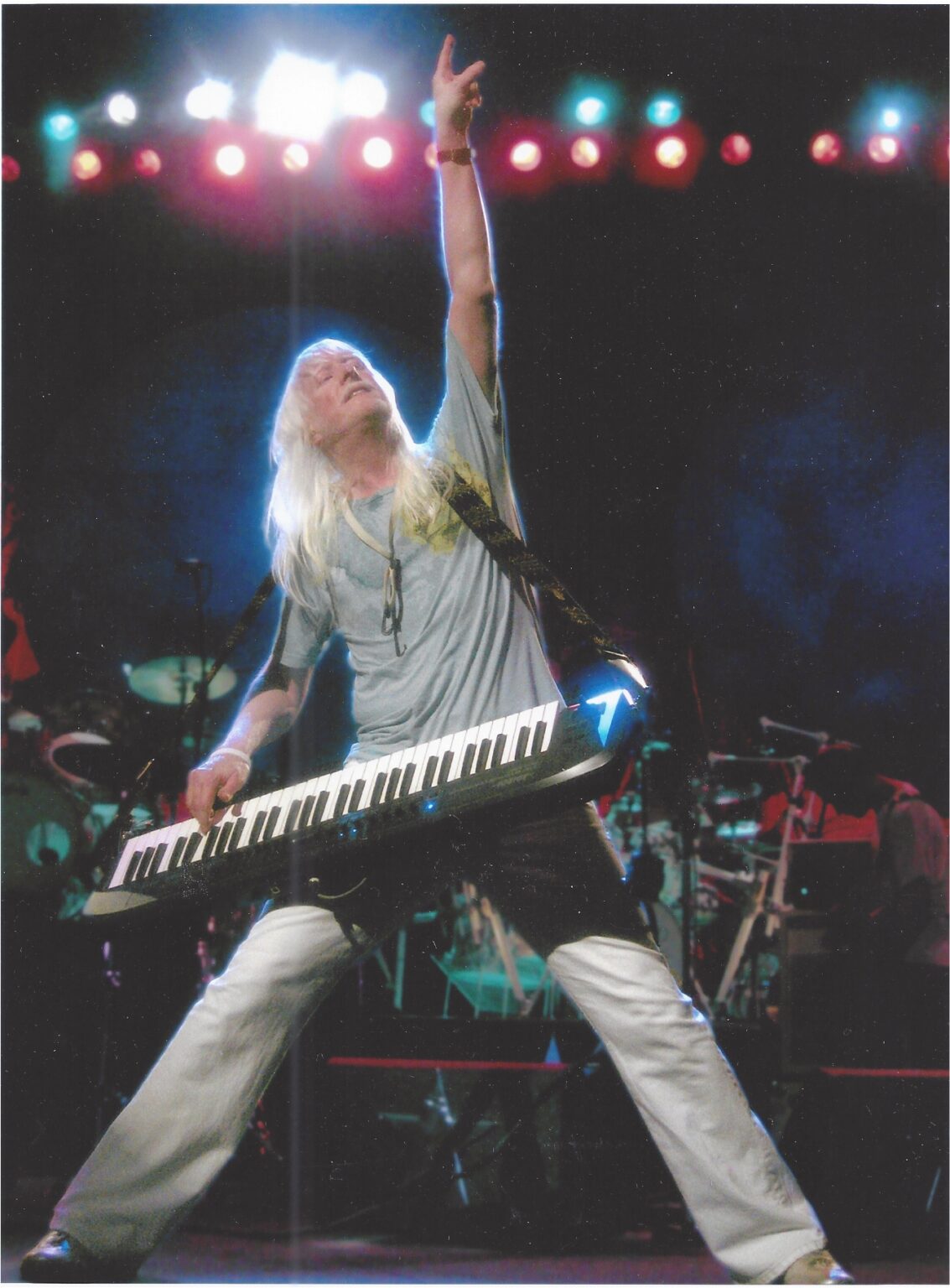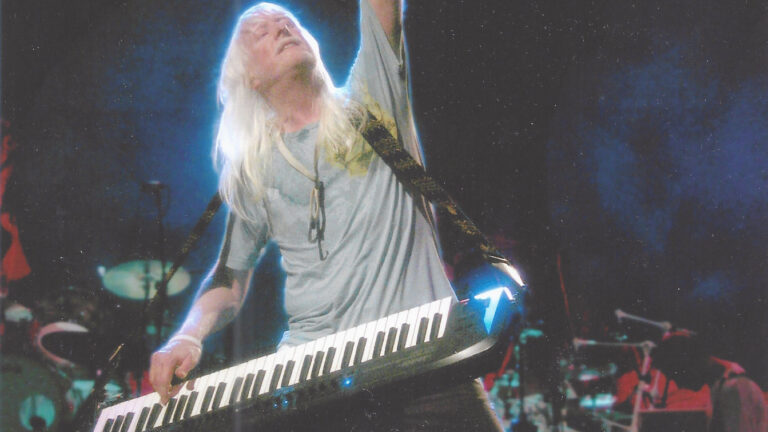The only reason I refuse to write a lengthy introduction to this interview is because most of what seminal ’70s rocker Edgar Winter told me was intensely informed, poetically poignant and more than a fine representation of the man and his work. He says it all with a clarity and wit that I can’t even begin to conjure as prelude. The only thing I gotta add before we traipse trippingly over to the transcript is this anecdote.In 1972, when Winter’s landmark record, They Only Come Out at Night, dropped right after Halloween, I was in the third grade and wouldn’t really get infected by rocanrol for another year. But when the time came, in the sixth grade, I’d slither and circle around the record bin where copies of the double platinum album might be housed, just to catch a glimpse of what I reckoned at the time to be the ultimate in rocanrol transgression.With flowing blond hair, bright red lips and enough bling to outsmart Drake nearly 40 years later, Winter’s portrait on the record cover shocked in a grand way. Outside, the picture provocatively drew one away from the normative; inside it was filled with songs about having a good time. The record expressed a joie de vivre that seemed to stem from the acceptance and then celebration of Winter’s androgynous rocanrol identity. Parents hated that shit.So, anyway, we talked about everything that had to do with his music, where it came from, where it goes when it pours out his sax or synth or rhythm guitar. He wanted to tell everyone who read the interview how grateful he feels to be able to make music for others to hear. He wants to remind us all that he loves and misses his late brother, blues legend Johnny Winter, that he’s finally up to compiling a tribute record for Johnny His friend Billy Gibbons will surely contribute. The fellow Johnny Winter totally rocked, and they had a psychic connection, the legendary multi-instrumentalist would like to add.But that’s all from the end of our talk. Here’s the whole deal, from the beginning.[Sound of phone ringing].Weekly Alibi: Hello?Edgar Winter: Hey, is this that Burque rock dude, August March?Yes, it is.Are you ready to rock and roll?! [sound of guitars and drums in background].Hell yeah, I am sooo ready to rock and roll, and I am damn sure that a guitarist from Beumont, Texas, is bound to head that way too.You’re right August, there are a lot of us. It’s an amazing area to grow up in. I didn’t fully appreciate that until I left.You left when you were 17 or 18, bright lights beckoning and all that, right?Johnny [Winter] and I started playing the Southern club circuit when I was 16, 17. You know we played, like, all the whisky a go-go type spots plus Atlanta, New Orleans, all over Alabama and Mississippi. We did that club circuit young. The interesting thing about Texas is that there are real cowboys out here, playing real country music. There are real authentic blues guys coming outta Texas, too. They’re not fucking around. Right on the border with Louisiana is where you get exposed to that swamp music—you know Cajun and zydeco music. So there were all those influences.So were you and your brother just driving around from town to town introducing the kids to that rocking blues sound?Yeah, you might say that. We also got to know some hot rhythm players because Mexico is so close to Texas. North Texas has a great jazz groove, so there’s an infusion of educated musicians there as well. Overall, it’s a very interesting mix. As I was saying, I didn’t appreciate all of that until I was in New York. I thought, oh wow this place is gonna have the greatest musicians in the world. And yes, that is true, it is a melting pot. But there is nothing characteristic like a New York sound. When I went to put together my first band, I went out to the West Coast, up to Berkeley, played with a lot of those great players in New York. But I ended up going back home and getting the guys I grew up with to jam with me. It was like the difference between chicken soup and gumbo.So you used that opportunity to define what many call a signature sound. What was that all about?I realized that it [Texas] is a special area, it’s home. You know, my dad played guitar and banjo and alto sax. He played in a string band in his youth. He sang in the choir. My mother had a beautiful voice too. She played the piano beautifully. My granddad was a fidler. My great-granddad played the trumpet. Everyone in our family was a musician. Music was something that was handed down from generation to generation, from father to son. That’s the way we learned to play.How did your brother Johnny figure into that early exposure to music?When I was 4-years-old, we started playing ukuleles, singing Everly Brothers songs. My mother told me we went on a local radio show to play, it was called the Uncle Willie Show. He played church organ and whatnot. I remember going on there to play when I was six. I grew up thinking that making music was a common household activity. I didn’t realize that wasn’t true until my brother and I started trying to put together bands. “What, your daddy didn’t teach you no chords,” I’d ask the neighborhood kids. I had thought everyone had to learn to read, write, spell, do math and make music! That was a rude awakening.Besides the radio show, how else did your mother influence your work?Well along those lines, another interviewer once asked me what was my first memory of music. I thought that was an interesting question. I had to cast my mind back to the way back. It was suprising what I came up with. It was something I had mostly forgotten and hadn’t thought about for a long time. I remembered being nestled in my mother’s lap and hearing this beautiful music flowing over me. This was before I had learned to speak. There are no words associated with this memory. I remember squirming around in her lap and just being able to peek up between her arms to see a piano keyboard. She was sitting there playing the piano and could see beautiful hands undulating, making these graceful motions and I remember thinking that there was a correlation between what her hands were doing and the music. Her hands were actually creating music! It was an amazing moment. There’s something about that moment of love and security that I still feel when I think about music. Which is all of the time, by the way, August.I suppose that has really affected your playing over the years.Well there is something about music. When I play, I feel lifted out of myself, like I am part of something higher, greater. It’s beyond myself. All of the cares, worries, the everyday, that all fades into the background. I feel the same way when I’m in the audience listening to someone great like Ray Charles or Stevie Wonder. I’m transported by music, swept away. There are no words for that; it’s a spiritual moment. That’s what I’ve always loved about music; I get that feeling everytime I pick up an instrument. Knowing that there is an audience there, that you can take people with you, that’s a great feeling.Besides Texas, Johnny Winter and your family what other musicians have influenced you?I’d say my most profound influence comes from Ray Charles. Ray was so versatile; he played gospel, blues, jazz and rock! He was very innovative, but he was also a very soulful singer. Loving jazz and classical and playing a helluva lot of instruments has made a huge difference in career.Well, you’re certainly all over the place on albums like They Only Come Out at Night … plus you’re the first rocanrol keyboard player to strap his instrument on like a guitar in order to rock the heck out, right?Yup. That was me. It’s such a simple idea, you would have thought someone would have come up with that earlier. It was a Univox keyboard that weighed like, 75 pounds. I put a strap on that; it was an ordeal. The ARP 2600 was easier. It had a separate keyboard and a long umbilical. I hated being stuck behind a big bank of keyboards. I kept thinking, “I wanna get out there and boogie!”What are you listening to today?A lot of jazz, but also Nat King Cole, Frank Sinatra, B.B. King, Bobby Blue Bland. I love some Coltrane and the Bird (Charlie Parker). I listen to a lot of fusion. I also like to listen to what is going on today.What about hip-hop?Well, it doesn’t resonate with me, but I think the rebelliousness … that’s what rock and roll was in the very beginning. It was meant to alienate the older generation. When I listen to hip-hop, I feel like the old grandfather guy, like my grandfather, yelling, “What the hell are you listening to, that ain’t music!” But it is cool music, it does exactly what it is supposed to do. Every generation has it’s own voice; it’s uniquely that of the young people, it belongs to them. It’s their magic.
Edgar Winter in concertSaturday, Oct. 27 at 8pmRoute 66 Legends Theater • 14500 Central Ave. SW • $20Tickets at holdmyticket.com










